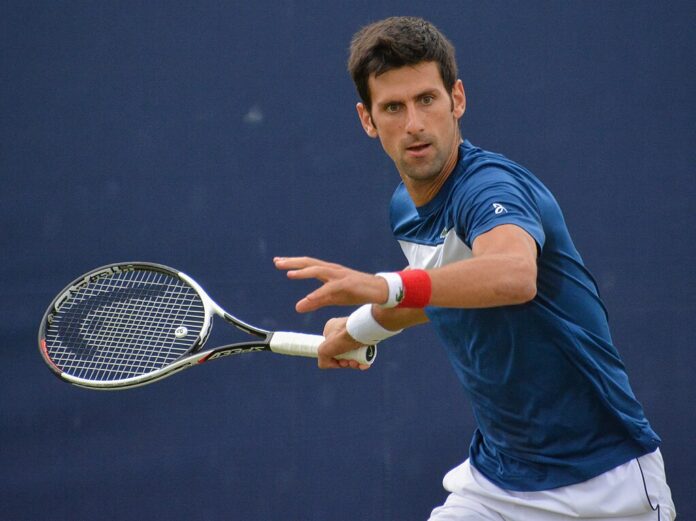Djokovic uncertain about playing French Open quarterfinal against Casper Ruud due to a knee injury
World No. 1 Novak Djokovic faces uncertainty about his French Open quarterfinal match after injuring his right knee in a five-set victory over Francisco Cerundolo. Despite winning 6-1, 5-7, 3-6, 7-5, and 6-3, Djokovic expressed concerns about his ability to play on Wednesday.
“I have had some minor knee issues for a few weeks, but no big deal,” Djokovic said. “Then I slipped in the second set and felt pain. I took a lot of painkillers, and they started to work by the end of the fourth set. I don’t know if I’ll play the quarterfinal; we’ll wait and see.”
The 37-year-old Serb is scheduled to face No. 7 Casper Ruud, who defeated American Taylor Fritz in four sets. Djokovic took a medical timeout early in the second set after appearing to tweak his knee during a lengthy point. He told the umpire, “I screwed up my knee. I’m slipping and sliding all the time.”
Despite the injury, the three-time Roland Garros champion avoided an early exit, securing his 370th career major win and breaking a tie with Roger Federer. Djokovic’s resilience and determination were evident as he battled through the pain to win the match.
Djokovic’s path to the quarterfinals has been challenging. He recently endured a gruelling five-set match against Lorenzo Musetti, which ended after 3 a.m. Sunday. Djokovic left the grounds after 4 a.m., adding to the physical toll on his body. Nevertheless, he fought back from a two-sets-to-one deficit against Cerundolo, displaying his characteristic tenacity.
In the second set, Djokovic’s trainer attended to his right knee and upper calf during a medical timeout. Despite the treatment, Djokovic’s movement remained visibly limited for the rest of the match. He frequently stretched his knee and showed signs of discomfort.
Cerundolo broke Djokovic in the second game of the third set, quickly taking a 3-0 lead. On set point, Cerundolo hit a service winner that Djokovic returned into the net, taking the set. The fourth set saw Cerundolo break Djokovic for a 3-2 lead, but Djokovic fought back to level the score at 4-all. Djokovic broke Cerundolo’s serve at 5-6 to win the set, raising his arms and shouting to the crowd.
In the fifth set, Djokovic fell again while hitting a forehand, complaining about the court conditions. He continued to fight, performing a full stretch to earn a winner at the net, and humorously mimicked swimming face-down on the clay. His perseverance paid off, as he secured the victory and remains in contention for his 25th major title.
Djokovic’s knee injury casts a shadow over his upcoming quarterfinal match against Ruud. His ability to recover in time will be crucial for his chances to progress further in the tournament. Djokovic has not won a title in 2024, and his quest to retain his world No. 1 ranking continues.
Despite his physical struggles, Djokovic’s mental toughness remains a key asset. His experience and resilience have helped him overcome numerous challenges throughout his career. As he prepares for the quarterfinal, the tennis world watches closely to see if he can overcome this latest obstacle.
Analysis:
Novak Djokovic’s knee injury and uncertain participation in the French Open quarterfinal have significant implications for his career and the tournament. The injury not only threatens his immediate prospects at Roland Garros but also raises concerns about his long-term fitness and ability to compete at the highest level.
Politically, Djokovic’s situation draws attention to the broader issue of athlete welfare and the physical demands of professional tennis. The ATP and tournament organizers may face scrutiny over the scheduling and court conditions that contribute to player injuries. Djokovic’s comments about slipping and sliding on the court highlight potential safety concerns that need addressing.
Economically, Djokovic’s potential withdrawal could impact the French Open’s viewership and commercial interests. As a major draw for tennis fans, Djokovic’s presence boosts ticket sales, viewership ratings, and sponsorships. His absence could lead to decreased audience engagement and financial repercussions for the tournament organizers and broadcasters.
From a sociological perspective, Djokovic’s injury underscores the physical toll of professional sports on athletes. The relentless competition and grueling schedules often lead to injuries, affecting athletes’ performance and longevity. This situation calls for a reevaluation of training regimens, recovery protocols, and support systems to ensure athletes’ well-being.
Locally, Djokovic’s potential withdrawal from the French Open could disappoint fans who eagerly anticipate his matches. Roland Garros, one of the most prestigious tennis tournaments, attracts spectators from around the world. Djokovic’s participation adds to the event’s allure, and his absence might impact local businesses and tourism associated with the tournament.
Gender perspectives also come into play, as the discussion around athlete injuries is not limited to male players. Female athletes face similar challenges, and their injuries often receive less media coverage and attention. Djokovic’s high-profile case can prompt a broader conversation about equitable support and coverage for all athletes, regardless of gender.
Race and minority perspectives are crucial in analyzing Djokovic’s situation. Athletes from diverse backgrounds often face additional pressures and challenges, including access to quality medical care and support. Djokovic’s case highlights the need for inclusive policies and practices that ensure all athletes receive adequate care and opportunities to recover and compete at their best.
The broader theoretical perspective involves examining the power dynamics and structures within professional sports. Djokovic’s injury and its impact on his career reflect the complex interplay between individual agency and institutional frameworks. Athletes navigate these dynamics, balancing personal aspirations with systemic constraints and expectations.
Overall, Djokovic’s knee injury and its implications extend beyond the immediate context of the French Open. They highlight critical issues within professional sports, including athlete welfare, economic interests, and sociocultural dynamics. As Djokovic prepares for his potential quarterfinal match, the tennis community and broader public remain engaged, reflecting the multifaceted impact of his situation.
